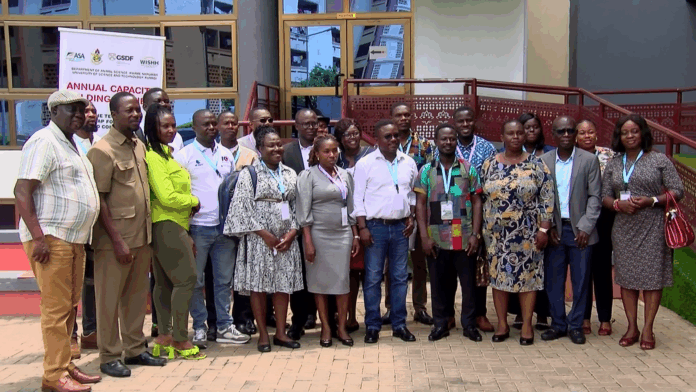Head of the Department of Animal Science at the Kwame Nkrumah University of Science and Technology (KNUST), Professor Kwaku Adomako, has expressed deep concern over the absence of commercial breeding companies in Ghana.
Speaking at a five-day capacity-building workshop organized by the Department of Animal Science in Kumasi, Prof. Adomako emphasized that the lack of such companies significantly hampers the efficiency and growth of animal production in the country.
The workshop, themed “Annual Capacity Building Project: Bridging the Technology Transfer Gap for Poultry Experts and Consultants in Ghana,” brought together poultry experts, consultants, and industry stakeholders.
According to Prof. Adomako, the unavailability of commercial breeding companies is a national issue that must concern all Ghanaians, particularly at a time when the country is working to reduce its high dependence on poultry meat imports from advanced economies.
“It is high time we came together as a nation to address this challenge by creating the necessary synergies and investment incentives for local firms to establish at least one commercial breeding company—not only to serve Ghana but the broader sub-Saharan African region,” he said.
While acknowledging the significant capital investment required to establish a breeding facility, Prof. Adomako stressed the importance of implementing sound policy directions and creating an enabling environment to empower local entrepreneurs and experts to lead the way in commercializing Ghana’s own poultry breeds.
He further noted that Ghana is not lacking in expertise, as there are qualified professionals capable of managing a successful breeding sector.
“What is needed is a coordinated national effort backed by policy, infrastructure, and financial support to ensure the smooth launch and sustainability of such initiatives,” he noted.
Prof. Adomako also raised concerns about the continued importation of poultry breeds that are not well-suited to Ghana’s climate, which often leads to high mortality rates among chicks.
These imported breeds, he said, are typically developed for temperate climates and may not thrive under local environmental conditions.
He is urging both public and private sector players to prioritize local solutions, highlighting that building a robust domestic breeding capacity is essential to achieving food security and reducing the poultry sector’s reliance on imports.
The Animal Science Department of the KNUST trained some experts and stakeholders in the poultry sector on some technological gaps impacting the sector’s productivity.
The project primarily focuses on actors in the industry involved with day-old chicks care during the first two weeks of being received and the husbandry skills needed for their growth.
It also sought to build easy understanding of the science of poultry farming of consultants and extension workers to help farmers make business case of their enterprises and become sustainable.
Mr. Francis Nsiah, Vice Chairman of the Poultry Farmers Association Western Region, described the training as impactful.
“We didn’t know how important it is to monitor housing temperatures when setting up poultry farms,” he said.
“This training has been very beneficial. We’ve learnt practical lessons that will help us grow our businesses. Collaborating with the department will allow us to benefit from research that supports and improves our operations.”
The training was held in collaboration with the Ghana National Association of Poultry Farmers (GNAPF), American Soybean Association (ASA) and funded by the World Initiative for Soybean in Human Health (WISHH).




